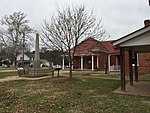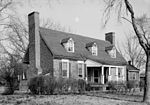Belle Air Plantation
1700 establishments in VirginiaHistoric house museums in VirginiaHouses completed in 1700Houses in Charles City County, VirginiaHouses on the National Register of Historic Places in Virginia ... and 4 more
James River plantationsMuseums in Charles City County, VirginiaNational Register of Historic Places in Charles City County, VirginiaPlantation houses in Virginia

Belle Air Plantation is an estate located on the north bank of the James River in Charles City County, Virginia, United States. It is located along State Route 5, a scenic byway which runs between the independent cities of Richmond and Williamsburg. Belle Air is listed on the National Register of Historic Places.
Excerpt from the Wikipedia article Belle Air Plantation (License: CC BY-SA 3.0, Authors, Images).Belle Air Plantation
The Glebe Lane,
Geographical coordinates (GPS) Address Nearby Places Show on map
Geographical coordinates (GPS)
| Latitude | Longitude |
|---|---|
| N 37.346944444444 ° | E -77.061111111111 ° |
Address
The Glebe Lane
The Glebe Lane
23030
Virginia, United States
Open on Google Maps









